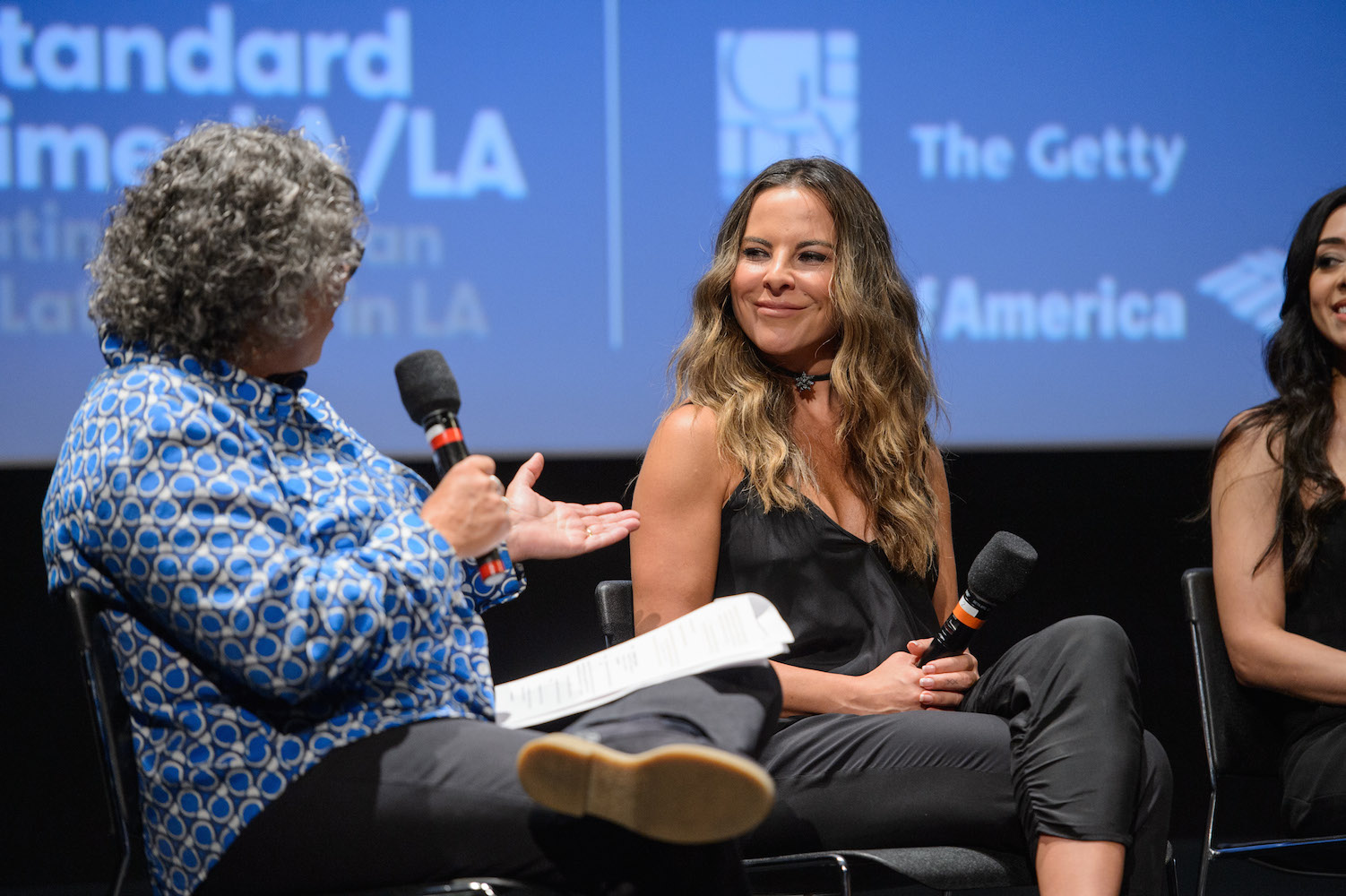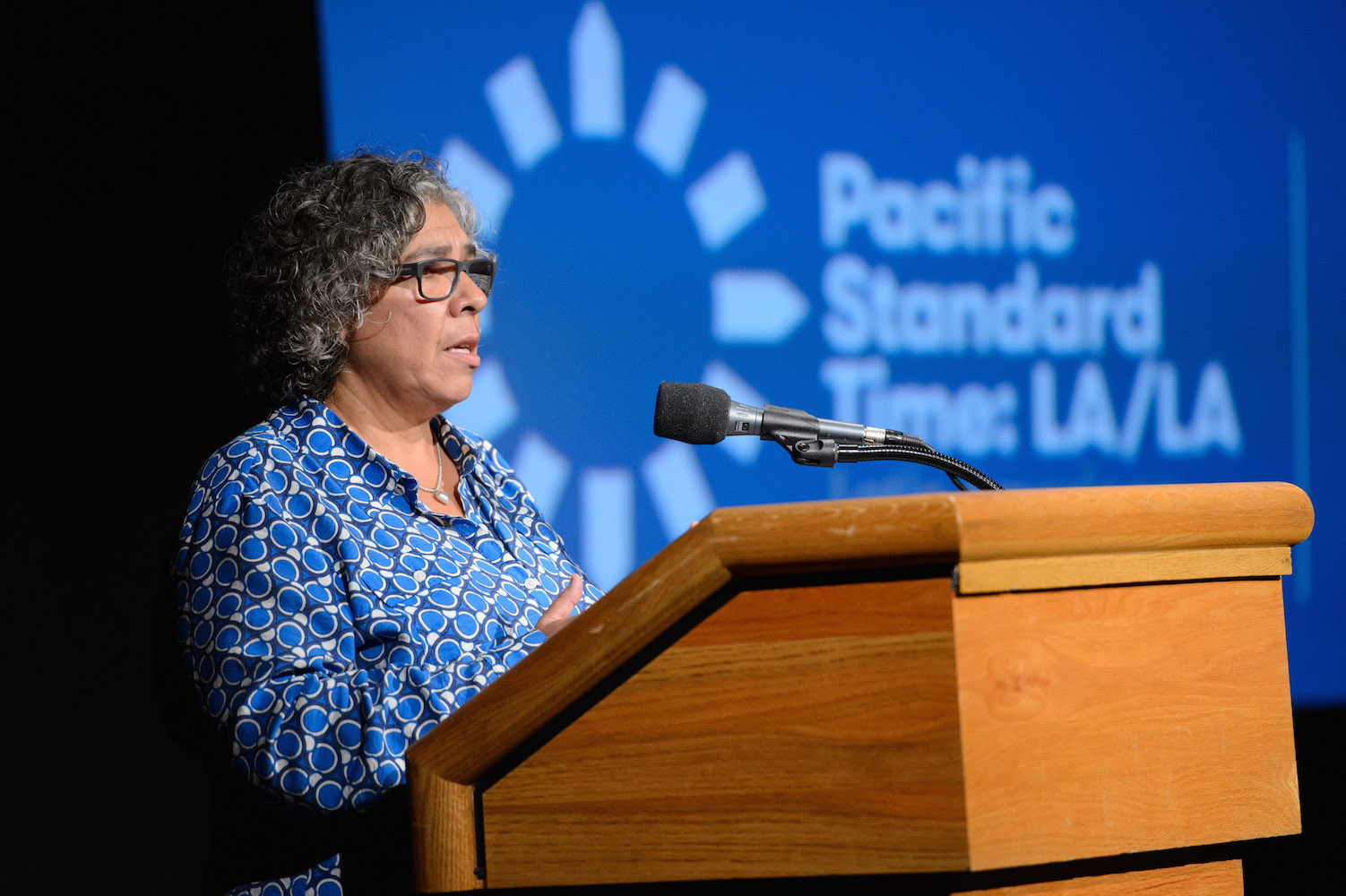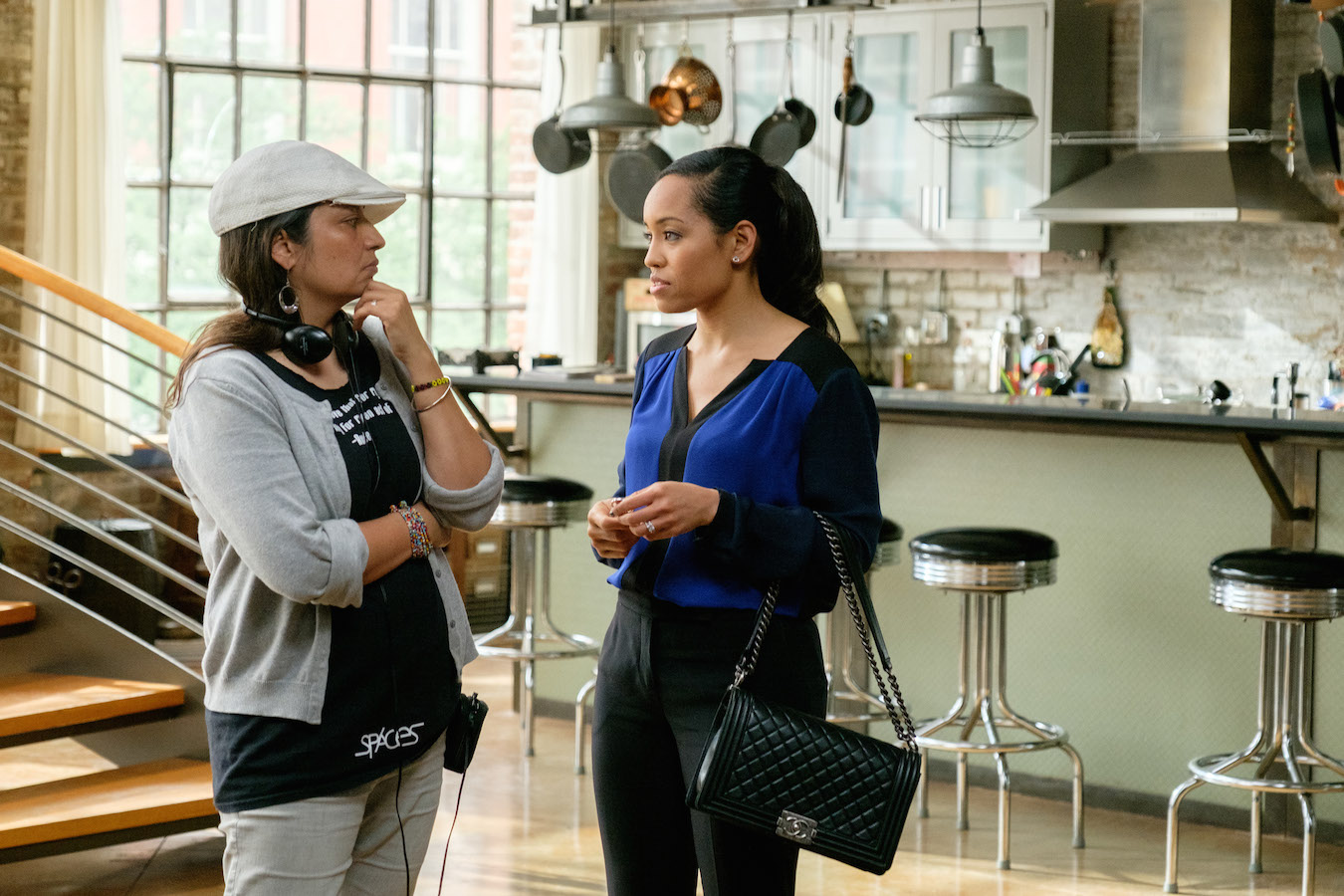Female voices were front and center this weekend at the Academy of Motions Picture Arts and Sciences. As part of its ongoing series, From Latina America to Hollywood, the people behind the Oscars put together a symposium titled, “How Do Latinas Experience Hollywood?” and invited some of the most recognizable Latina female talent in the industry to dish on that complicated question.
The simplest answer is that Latinas often don’t experience Hollywood, and for those who have carved out a space within it, the experience is far from being similar to men or even white women. Actresses Kate del Castillo, Karla Souza, and Aimee Garcia; directors Patricia Riggen, Aurora Guerrero, Natalia Almada, Fina Torres, and Gabriela Tagliavini; screenwriter Ligiah Villalobos, casting director Carmen Cuba, entertainment publicist Ivette Rodriguez, and cinematographer Mónica Reina, joined the moderator – documentarian Evangeline Griego – to tackle a variety of topics. They spoke about sexism, discrimination, and the empowering ways in which all of them have succeeded in a system that is not designed for women of color to have access to.
It’s the first time such an impressive group of Latinas working in film and television came together for an event of this kind. Latinas are ready and able to take charge of the entertainment business, and Hollywood is waking up to it. That Oscar statuette better get acquainted with these women, they’ll be taking him home some day soon. Check out some of the best moments from a night with Latinas at the Academy.
Kate del Castillo on the Degrading Culo Shot
I think one of the things that have happened to me in the United States, I’ve been here for a long time now, is deciding not to sexualize our characters. As actresses, we need to take care of them because, especially being a Latina, there are so many stereotypes still. It just happened to me in a movie. I had to be in my panties. I was playing a lesbian hippie, but the director, thank God, was a woman. The camera guy had the camera right on my ass, and he said, “The culo shot, no?” The director was like, “That’s not what the movie is about. She happens to be like that, but that’s not what I’m trying to say.”
Karla Souza on the First Time She Wasn’t Objectified
I recently worked with Catalina Aguilar on Everybody Loves Somebody, and I had the same culo shot experience. I had just recently done another movie where the camera does the pan and I had to be running on the beach in slow motion. I had done so much dieting for that. So I was on this new film, and I was waiting for the culo shot and I was like, “When are we doing the body shot?” And she was like, “No, we’re staying here [points to her face], this is where it’s happening.” And I just started crying. I was like, “I can go have that pastel over there?”
Kate del Castillo on Being a Perpetually Struggling Actress
I’ve been an actress since I was nine… I’m a struggling actress still, because I still don’t get the jobs that I want. I don’t have a family, but I do have to pay the bills for myself, so sometimes you have to prostitute yourself in that way, and do things that you don’t really love, or do commercials, or this and that, just because you need to eat. At least I’m not selling quesadillas, not saying that that’s wrong, but at least I’m still doing my craft, what I love, and what I’ve be doing my entire life.
Karla Souza on the Need for More Latino Writers
When I got the part, then they decided to make her Latina, and I said, “No, please!” And they asked me why, and I said, “You’re going to have me speaking like “thees” [mock accent] and be all sexual, and I can’t do that. I can’t give you that.” So they said, “No, that’s exactly what we don’t want to do.” I said, “Okay, but is there a Latin writer? Because it all starts on the page, if not, they’re trying so hard to not write stereotypes, however, there’s so little that they know about the culture.”

Aimee Garcia on How Rita Moreno Inspired Her
Rita Moreno was a huge inspiration for me. I remember reading in Latina magazine that she was one of the few people, not just women, to win an Oscar, a Tony, a Grammy and an Emmy. I didn’t know that was possible, because I was the first person in my family to be in entertainment. That was a big change for me, because I’m half-Puerto Rican, half-Mexican, and I thought, “She’s Boricua! If she can do it, I can do it!”
Aimee Garcia on Playing a Latina Scientist in RoboCop
I told my team, “Why can’t a Latina be a scientist?” [They said], “Well, it’s written Asian.” “I know it’s written Asian, but I have three degrees from Northwestern, and my Mom was the first Latina to graduate from Northwestern’s dental school, and she’s an orthodontist, so for me, I feel like I can play a scientist easier than a lot of other things.” They pushed to get me in, and they changed the role. I feel like it wasn’t even in their mind to think of Latinas as Molecular Biologists and engineers, and I think that has to change.
Natalia Almada on Being Asked, “Who’s Your Audience?”
I don’t think too much about the audience. I think it’s a question that’s often asked when you come from the periphery, in a sense. “Who’s your audience?” is a loaded question that’s often code for, “I’m not your audience, so who’s your audience? I don’t speak Spanish, so who’s your audience?” I also find that one of the most rewarding things about my filmmaking career has been showing my films to such different audiences: high school students in LA, or we were just in South Korea, all of these different places. When they say, “Well who’s your audience?” It’s all of those different things, and different people, and what’s interesting is to see how do they connect differently, and what do they understand in the film. That’s rewarding for me, so I hate to think of this limiting concept of pinpointing a demographic as an audience. I think there’s a different way of thinking about it.
Patricia Riggen on Losing Her Creative Voice
The question is, how do we get a job? For me, that’s always in my head, and I’m sure for all of us, it’s our daily fight. Our entire beings are devoted to getting a job, to finding it, and once you get it, to survive it, because even if you get it, they’re going to make your life impossible throughout, from the first minute to the last. I feel that I have lost my voice in the last few years in the search of a career. I feel like I need to create a number of movies or shows or whatever to create a name, so then I can go back to doing my [own] stuff.

Patricia Riggen on Why Being a Woman in the Industry Is More Difficult Than Being Latina
The problem is being a woman, not being a Latina, that’s the main problem that we all here have. It’s very clear. I never realized I was a woman, it’s “they” who realized I was a woman. There are three mega-Mexican amigos that have opened up the space for Latinos to come and direct space movies and [even] Harry Potter movies. Thank God those guys did a service for all Latinos. We can access those kinds of projects, but the problem is being a woman. So what I’ve been doing lately is I’ve been using the Latina angle to get the job that would be for a man, so I can get it.
Gabriela Tagliavini on Token Latino Stories
I hate when they send me these projects that are Latino, with a Latino family and the abuelita and there’s no story. Sometimes it’s not even written by a Latino, it’s kind of like a “Mexican-curious” kind of story. I’d prefer to go the other way around, and have a good story that somebody writes, and then put Latino actors and actresses in it. It starts behind the camera. If we have Latina writers and Latina directors, then it would be no question of who is in front of the camera, because we’re telling the stories that we want.
Aurora Guerrero on Honoring Her Creative Spirit While Making Political Work
I definitely start with the personal, and I feel like my experiences are specific, I feel like there are a lot of people out there that could connect to what I have to say, because it hasn’t been reflected.
I do start there, and then I’m definitely impacted by what’s happening in the world, so my creativity is constantly buzzing, because the world is so crazy all of the time, prior to Trump, [during] Trump, and probably post [Trump]. There’s a lot that is making me want to put pen to paper, or finger to keyboard. Then, as the story starts to come about, if I don’t particularly belong to a group that I’m writing about, say undocumented people, because I’m a citizen, so I have that privilege, then I think about, “How do I connect with the undocumented community to try and have a dialogue very early on?”
I’m in conversation with them about the stories that I’m thinking about, and seeing… what’s the story they want to see reflected, and then we start to talk about how else can this process of making this film can support whatever work the undocumented community is doing.
There’s an organic process that I engage in, where I feel like I have to honor my writing spirit, my creative spirit, but I’m also thinking about what I want to say politically, and hoping that what I want to say is smart. So that’s my part of my process.
Mónica Reina on the Frustration of Being Underestimated as a Female Cinematographer
When I left film school, I was working as a cinematographer in the 90s. I would arrive on the set and everyone would go, “The producer is here!” And I was like, “No, I’m the cinematographer. I’m the DP.” People were like, “Whaaaat?” Everyone got scared, the gaffer, the staff. “How is this woman going to tell me where to put the camera, or the lights?” It was like that every time, in commercials or anything I was shooting, and this enraged me. One time, I came home around 3 or 4 a.m. after a 24-hour shoot, and I swore to myself, “One day I will own my own company, and I will have the cameras to shoot whatever I want, whenever I want, and it doesn’t matter if I’m a martian, or a lesbian, whatever I am, but as a woman, I don’t need to apologize to anybody.”

Ivette Rodriguez on Working to Get Latinos Represented On the Screen
I’ve worked with the studios, and I’ve worked with great filmmakers and actors, and my company turned 20, and now I 100% feel responsible to say what I have to say, when I have to say it. I don’t work for a studio, I don’t work for a network, I don’t work for an agency, and nobody can fire me, so right now I feel a responsibility for us to see ourselves reflected. For my children, my family, for us to see ourselves reflected in a multi-dimensional way in television and film. This is a very difficult time in our country, and I feel that the media and Hollywood can absolutely 100% make a difference, and bring this country together, and that’s by what they put on the big and small screen.
Ligiah Villalobos on How TV Show Go, Diego, Go! Was a Political Statement
The reality is, Hollywood isn’t making Latino films. I just taught a film development class at Cal State LA, and in one of the classes we broke down all of the major studios and the films that they had made, and then three mini studios, and out of the seven studios that we looked at, not a single one had made a Latino film in all of 2016. One of the things I think we do need to consider as content creators, whether you’re a director or a writer or even an actor is, sometimes you have to open different doors in order to tell your stories. I’ve gone from working on primetime television to preschool [programming]. My agent told me not to take that job, my lawyer told me not to take that job, my manager told me not to take that job. That show was Go, Diego, Go! It was on the air for three years, I did 60 episodes of the show. Politically, I was able to put a young kid who was a scientist and was teaching kids Spanish [on television]. That is political to me.
Fina Torres on How the Industry Has Slowly Progressed
From the moment I came here in 2000 to today in 2017, things have changed. There are more women working in the movies. Women are heroes in action movies now. 20 years ago, that didn’t exist.
Carmen Cuba on Creating Change as a Casting Director
When I look back, it’s about the voices I can help empower. Changing a character from white to Latina, or male to female, or supporting filmmakers who have diversity of thought. That for me is very important. I think I have a unique experience because I’m “ethnically ambiguous.” When I talk about changing a part, I know that they listen in a different way, because they don’t know how I’m going to react. My personal experience has been, I am who I am. I come from a super diverse background, I didn’t only grow up here, none of us only grew up here, and I’m going to push for the world to look like what my world looks like, and what it didn’t look like when I moved here when I was 11. For me, it was Connie Chung. I was going to be Connie Chung, and then Oprah came along.







